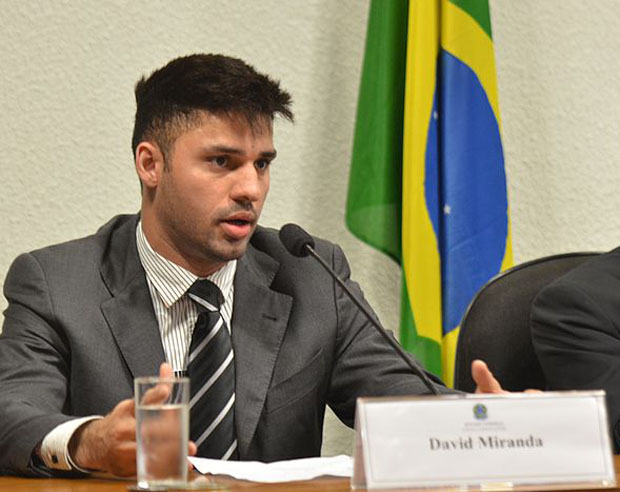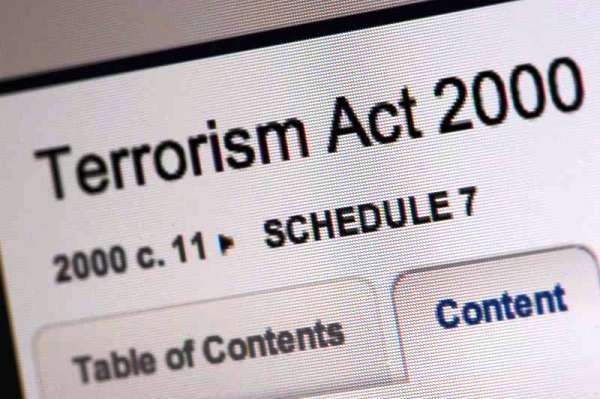4 Mar 2014 | Americas, Awards, News, United States
Glenn Greenwald had previously blogged on surveillance and civil liberties for Salon and the Guardian, attracting thousands of followers with his dogged writing. Laura Poitras’s background is in documentary making, having made highly acclaimed films about Iraqis living during the US military occupation and The Oath, a film about Yemenis caught up in the War on Terror.
A lawyer by training, Greenwald built a strong reputation for detailed, forensic articles. According to the Guardian, an article by Greenwald about Poitras’s work and fears over targeting by the government was what convinced Edward Snowden to approach him with his cache of NSA files in late 2012.
Working with a range of outlets, from the Guardian to Brazil’s O Globo, Greenwald published a range of stories on the workings of the National Security Agency’s surveillance. Germany-based Poitras collaborated with Der Spiegel amongst others, generating huge debate in that country.
In August 2013, Greenwald’s partner David Miranda was detained at Heathrow Airport under terrorism legislation and had documents he had received from Poitras confiscated by UK authorities.
Interviewed by Esquire magazine, Greenwald explained why he felt it was important to uncover mass surveillance: “ultimately the reason privacy is so vital is it’s the realm in which we can do all the things that are valuable as human beings. It’s the place that uniquely enables us to explore limits, to test boundaries, to engage in novel and creative ways of thinking and being”
Nominees: Advocacy | Arts | Digital Activism | Journalism
Join us 20 March 2014 at the Barbican Centre for the Freedom of Expression Awards
This article was posted on March 4, 2014 at indexoncensorship.org
19 Feb 2014 | Campaigns, United Kingdom

David Miranda (Image: Elza Fiúza/Agência Brasil/Wikimedia Commons)
Index on Censorship today expressed disappointment at the High Court’s dismissal of David Miranda’s application for a judicial review of the use of anti-terror laws to detain him at Heathrow Airport.
“This ruling represents a dangerous elision of terrorist activity and legitimate journalistic practice,” said Kirsty Hughes, Chief Executive of Index on Censorship. “We must hope that it will not stand as precedent, as it could seriously endanger journalists working in the public interest.”
Mr Miranda, the spouse of journalist Glenn Greenwald, was stopped and searched under Schedule 7 of the Terrorism Act 2000 on 18 August 2013. He had been carrying encrypted files and documents originating from Edward Snowden’s leak of information on the National Security Agency’s mass surveillance programme.
A coalition of media and free speech organisations, including Index on Censorship, argued that it is inappropriate to use terror laws against someone such as Miranda, who was engaged in journalistic activity in transporting the documents intended to be used as source material for news stories in the public interest.
But the High Court today ruled that the use of the Terrorism Act did not infringe David Miranda’s right to free speech, or the rights of journalists to protect sources and materials. In his judgment, Lord Justice Laws ruled that the Schedule 7 detention of Miranda had been proportionate and did not “offend” his right to free speech under the European Convention on Human Rights.
Read the full judgment here
This article was published on 19 February 2014 at indexoncensorship.org
2 Dec 2013 | About Index, Campaigns, Statements
Dear Rt Hon Keith Vaz MP,
Index on Censorship is writing to you ahead of Guardian editor Alan Rusbridger’s appearance before the Home Affairs Select Committee’s hearing on counter terrorism.
We believe that the Guardian’s publication of details of GCHQ’s digital surveillance techniques has been very much in the public interest.
Mass data retention and monitoring is a hugely important issue. As more and more of our lives are lived online, it is only right that British people should know how and why the security services gather and monitor digital information. We should be able to debate whether the security services are acting legitimately, legally and proportionately, or are going beyond what is suitable and proper in any democratic, rights-based society. The Guardian’s revelations should be the beginning of a public debate on how this work is done, and with what oversights.
We are concerned that rather than a debate being opened up, the focus has instead been on criticising the Guardian’s work, with even the Prime Minister threatening to take action against the newspaper if it did not take social responsibility. Index on Censorship maintains that the Guardian has shown great social responsibility in investigating, reporting and publishing the details of this story, having maintained open communication with security services and the DA Notice committee.
The Guardian has also lived up to the responsibility of a free press to reveal facts and issues of interest to the public. A British newspaper should be able to report on these issues without fear of retribution. But comments made by politicians and the security services made have led many round the world to question Britain’s commitment to press freedom. For example, the New-York based Committee to Protect Journalists rightly pointed out that: Governments around the world look to the UK as a model for media policies, but in this case, Cameron seems to be taking a page from the book of less enlightened governments that invoke ‘social responsibility’ to ward off valid criticism.
Finally, Index on Censorship is troubled by the use of counter-terror measures to detain David Miranda, the partner of former Guardian journalist Glenn Greenwald. We believe the use of terror legislation to obtain journalistic materials, without court oversight, is a threat to free expression and to anyone involved in journalism. As part of a coalition of newspapers, journalists organisations and campaigners which submitted an intervention to the judicial review of Mr Miranda’s detention at Heathrow airport, we are concerned that using Schedule 7 of the Terrorism Act 2000 against people engaged in journalistic activities runs a real risk of conflating journalism–particularly journalism investigating the intelligence services–with terrorism.
Yours sincerely
Kirsty Hughes, Chief Executive
Index on Censorship
22 Aug 2013 | Counter Terrorism, News, Politics and Society
 The examination and detention of David Miranda on 18 August at Heathrow Airport has brought Schedule 7 of the Terrorism Act 2000 in to sharp focus. Its purpose is to deter terrorism, an aim that it strives to achieve through facilitating the stop, search and examination (under compulsion) of individuals. I say individuals rather than suspects as there does not need to be any reasonable suspicion that any terrorist offence has been or will be committed. That said the selection of individuals is to be based on “informed considerations” (such as intelligence), should not be used arbritrarily and must only be applied to determine those who may be concerned in acts of terrorism. The power only applies to those believed to be entering or departing the United Kingdom and this belief must be justifiable in the individual circumstances.
The examination and detention of David Miranda on 18 August at Heathrow Airport has brought Schedule 7 of the Terrorism Act 2000 in to sharp focus. Its purpose is to deter terrorism, an aim that it strives to achieve through facilitating the stop, search and examination (under compulsion) of individuals. I say individuals rather than suspects as there does not need to be any reasonable suspicion that any terrorist offence has been or will be committed. That said the selection of individuals is to be based on “informed considerations” (such as intelligence), should not be used arbritrarily and must only be applied to determine those who may be concerned in acts of terrorism. The power only applies to those believed to be entering or departing the United Kingdom and this belief must be justifiable in the individual circumstances.
Be in no doubt that, whatever the expressed safeguards as to informed selection and justifiable beliefs, Schedule 7 is draconian. It was meant to be. It was aimed at preventing terrorism through exceptional legislative means. It exceptionally permits individuals to be stopped, questioned under threat of prosecution if they refuse to answer and their possessions seized (under threat of prosecution) should they fail to comply. It turns the accepted approach to criminal suspects on its head; the need to demonstrate a prior reasonable suspicion of offending is removed and the protection of silence is pierced by a compulsion to answer all questions. It is a blunt but arguably necessary tool in the fight against terror. The danger is that it becomes a blunt tool to batter down doors unconnected with terrorism. It cannot and should not be applied as a means to achieve any other objective.
In order to obtain confidential or sensitive information such as journalistic content the police must ordinarily undergo a route that involves obtaining a production order. To obtain such an order they must essentially satisfy a court that the order is justified and the protection afforded to the material can be overcome. Evidently Schedule 7 was never meant to take aim at journalism but, given the powers of compelled answers and seizure of material, one can instantly appreciate the fast lane route it would provide to obtaining information for extraneous intelligence purposes. That would be an abuse of the Act, a likely breach of Article 10 (freedom of expression) and unlawful on a number of levels but how can we safeguard against it? “Quis custodiet ipsos custodies” [who will guard the Guardians] wrote Juvenal. Rather apt.
Dan Hyde is a partner at HowardKennedyFsi LLP
This article was originally published on 22 Aug, 2013 at indexoncensorship.org


 The examination and detention of
The examination and detention of